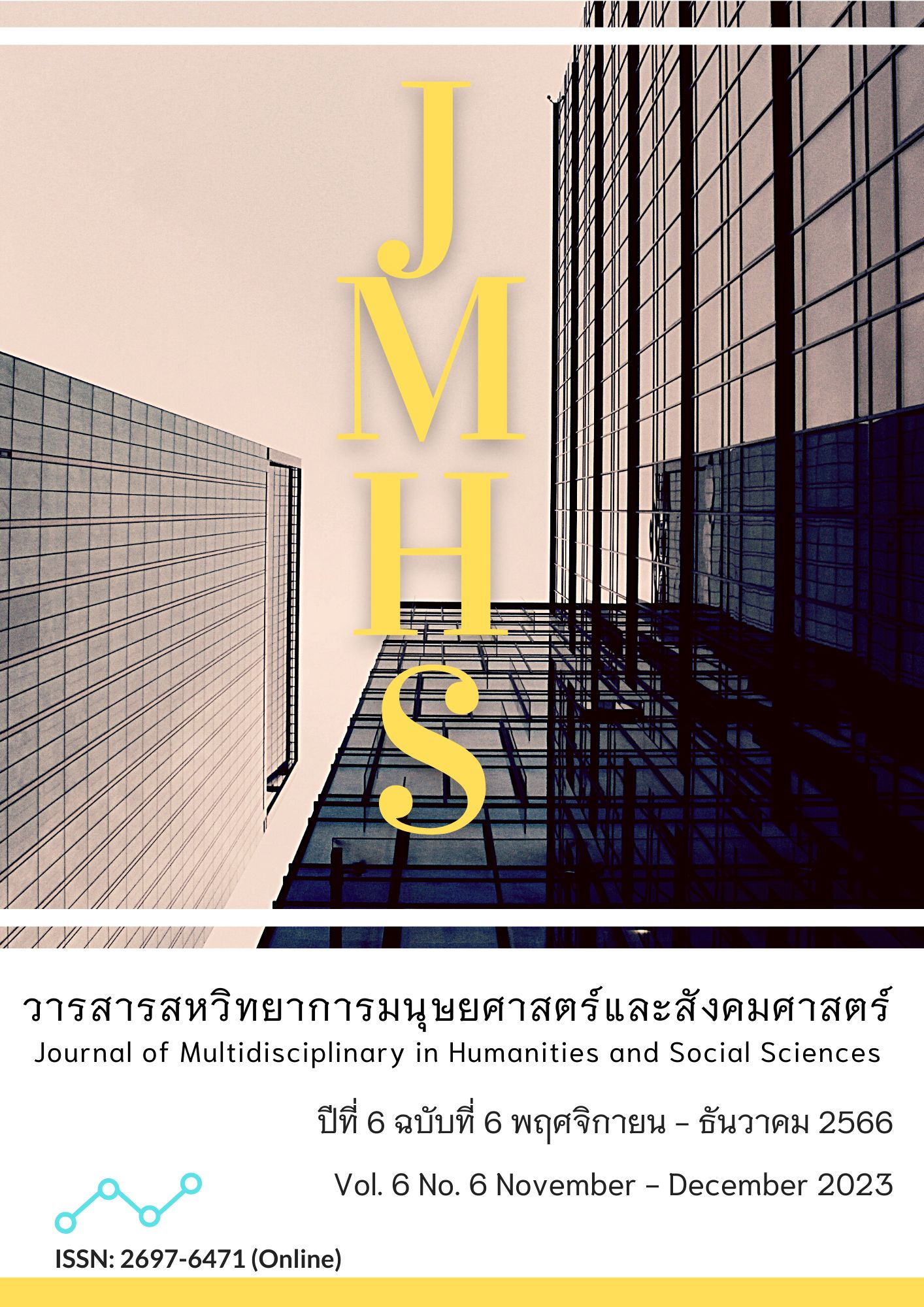Knowledge Management, and Lifelong Learning for Future Skills of Mass Media in Prevention of Social Violence in the Digital Era Media
Main Article Content
Abstract
This article aimed to (1) study the context and factors that influence media knowledge management in preventing social violence in the digital era media; (2) create a knowledge management model and a lifelong learning process for future skills of mass media in preventing social violence in the digital era media; and (3) develop future skills and a lifelong learning process of mass media in preventing social violence in the digital era media. The sample included executives, journalists, media organizations, and scholars. They were selected by purposive sampling. The instruments for collecting data were a questionnaire and an in-depth interview. Analysis of data by descriptive statistics such as frequency, percentage, and standard deviation; in addition, content analysis by inductive process, extended text, and visual display. The research results were found as follows:
1. The factors that affect the knowledge management of the media depend on the knowledge management of the organization, managing the organization's performance, and implementing policies and regulations.
2. The model of knowledge management and lifelong learning for future skills in mass media begins with knowledge identification, learning, knowledge codification and refinement, knowledge access, knowledge sharing, knowledge utilization, and monitoring.
3. For improving future skills and a lifelong learning process, there was a research and development department in the organization, raising awareness, technology encouragement, self-knowledge enhancement, reward-based, creation of the network and agencies to protect it. The media organization should provide knowledge management to lead to a lifelong learning process.
Article Details

This work is licensed under a Creative Commons Attribution-NonCommercial-NoDerivatives 4.0 International License.
Views and opinions appearing in the Journal it is the responsibility of the author of the article, and does not constitute the view and responsibility of the editorial team.
References
ประพนธ์ ผาสุขยืด. (2550). การจัดการความรู้ฉบับขับเคลื่อน. (พิมพ์ครั้งที่ 4). กรุงเทพฯ: ใยไหม.
พยัต วุฒิรงค์. (2557). การจัดการนวัตกรรมทรัพยากร องค์การแห่งการเรียนรู้ และนวัตกรรม. กรุงเทพฯ: สำนักพิมพ์แห่งจุฬาลงกรณ์มหาวิทยาลัย.
พสุธิดา ตันตราจิณ, พิไลพรรณ นวานุช, ไกรภพ กฤตสวนนท์, และ สุภัค ศิริปราการเจริญ. (2559). ทุนมนุษย์: การพัฒนาทรัพยากรมนุษย์ในศตวรรษที่ 21. วารสารสุทธิปริทัศน์, 30(พิเศษ), 115-123.
วิภาวดี สีตนไชย และ กัมปนาท วงษ์วัฒนพงษ์. (2564). พุทธวิธีในการจัดการทุนมนุษย์ในพุทธศาสนา. วารสาร มจร พุทธปัญญาปริทรรศน์, 6(1), 211-220.
วีรินทร์ทิรา นาทองบ่อจรัส. (2558). การบริหารจัดการความรู้โครงการอันเนื่องมาจากพระราชดำริของสื่อมวลชน. EAU Heritage Journal Social Science and Humanities, 5(3), 139-146.
Albarran, A. B., Mierzejewska, B., & Jung, J. (Eds.). (2018). Handbook of media management and economics. New York: Routledge.
Becker, G. (1962) Investment in human capital: A theoretical analysis. Journal of Political Economy, 70, 9-49. http://dx.doi.org/10.1086/258724
Bharati, P., Zhang, W., & Chaudhury, A. (2015). Better knowledge with social media? Exploring the roles of social capital and organizational knowledge management. Journal of Knowledge Management, 19(3), 456-475.
Channar, Z. A., Talreja, S., & Bai, M. (2015). Impact of human capital variables on the effectiveness of the organizations. Pakistan Journal of Commerce and Social Sciences, 9(1), 228-240.
Chigozie, M. P., AGA, C. C., & Onyia, E. (2018). Effect of human capital development in organizational performance in manufacturing industries in South-East Nigeria. International Journal of Academic Research in Economics and Management Sciences, 7(3), 60–78. https://doi.org/10.6007/IJAREMS/v7-i3/4378
Desouza, K. C., & Paquette, S. (2011). Knowledge management: An introduction. New York: Neal.
Farooq, R. (2019). Developing a conceptual framework of knowledge management. International Journal of Innovation Science, 11(1), 139-160.
García-Holgado, A., & García-Peñalvo, F. J. (2017). A metamodel proposal for developing learning ecosystems. In Learning and Collaboration Technologies. Novel Learning Ecosystems: 4th International Conference, LCT 2017, Held as Part of HCI International 2017, Vancouver, BC, Canada, July 9-14, 2017, Proceedings, Part I 4 (pp. 100-109). Springer International Publishing.
King, W. R. (2009) Knowledge management and organizational learning. In Knowledge management and organizational learning, Springer, Boston, 3-13. https://doi.org/10.1007 /978-1-4419-0011-1_1
Nguyen, L., Luu, P., & Ho, H. (2020). Factors influencing life-long learning: An empirical study of young people in Vietnam. The Journal of Asian Finance, Economics and Business, 7(10), 909–918.
OECD. (2021). OECD skills Outlook 2021: Learning for life. Retrieved from https://read.oecd-ilibrary.org/education/oecd-skills-outlook-2021_0ae365b4-en#page1.
Phumphongkhochasorn, P., Damnoen, S., Tuwanno, P. D. M., Srichan, P. W., & Udomdhammajaree, P. (2022). Educational Quality Assurance and School Management Standards According to International. Asia Pacific Journal of Religions and Cultures, 6(1), 1–16. Retrieved from https://so06.tci-thaijo.org/index.php/ajrc/article/view/244349
Rahman, S., Islam, M. Z., & Abdullah, A. D. A. (2017). Understanding factors affecting knowledge
sharing: A proposed framework for Bangladesh’s business organizations. Journal of Science and Technology Policy Management, 8(3), 275-298. https://doi.org/10.1108/JSTPM-02-2017-0004
Rezaei, F., Khalilzadeh, M., & Soleimani, P. (2021). Factors affecting knowledge management and its effect on organizational performance: Mediating the role of human capital. Advances in Human-Computer Interaction, 5, 1-16. https://doi.org/10.1155/2021/8857572


